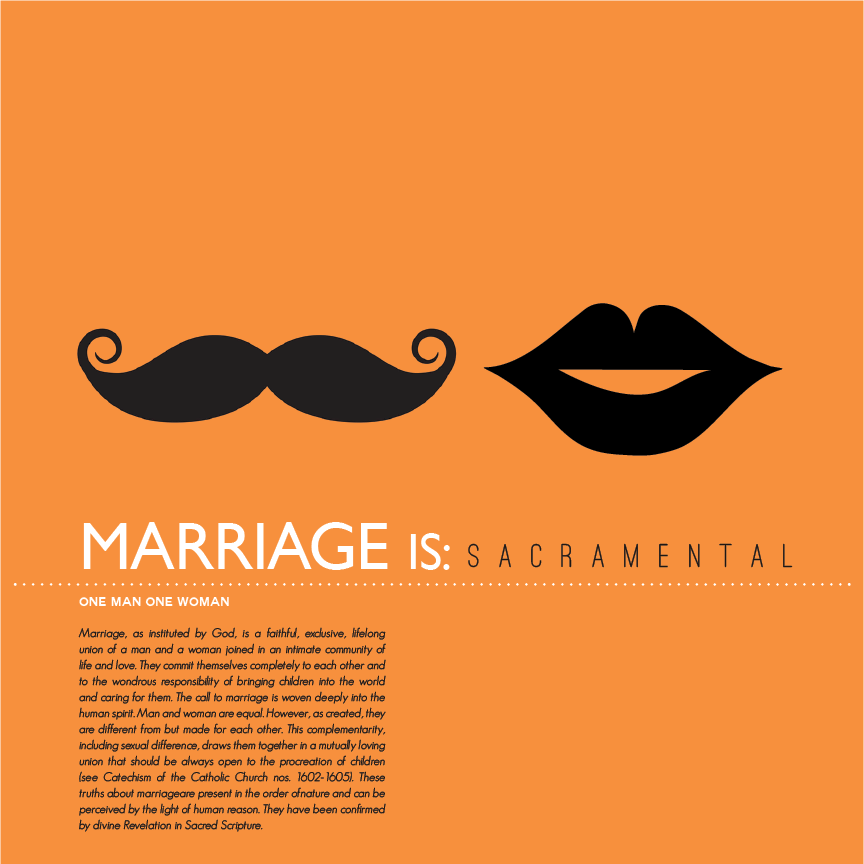A Question of Rights
Q: Isn’t same sex marriage just a matter of civil rights – similar to the civil rights movement of the 1960’s?
A: No. The question of interracial marriage in the 1960’s was who can get married. The question of same sex marriage today is what marriage is. This isn’t a matter of society allowing or not allowing something. This is a question of whether or not something is possible. It’s not a question of civil rights whether men should be allowed to breastfeed – they can’t.
It’s not a question of civil rights whether a man should be allowed to be a mother – he can’t.
Similarly, the question here is not whether I should be allowed to marry whomever I choose. The question is whether a man and a man, or a woman and a woman, can form the kind of union that is marriage.
If marital union is only a matter of affection then they can, and it’s a matter of civil
rights. But if marital union is also the kind of union from which children come – even if no children actually come from it – then they can’t. The bodies of a same sex couple don’t go together that way.
It’s not a matter of denying someone’s civil rights – which we should never do. It’s a matter of admitting what is and isn’t possible.

A Question of Acceptance
Q: Isn’t same sex marriage essentially a matter of letting consenting adults decide what to do with their own bodies?
A: Consenting adults also engage in adultery, prostitution, polygamy and incest. Are those OK? Should we endorse them, because consenting adults decide to do them? If whatever consenting adults decide to do with their bodies should be ruled in, then adultery, prostitution, polygamy and incest must be ruled in.
If adultery, prostitution, polygamy and incest are ruled out, then we can’t automatically rule in whatever consenting adults decide to do with their bodies.
Q: What’s so special about sexual intercourse between a man and a woman? Isn’t sexual intercourse just an expression of affection between persons?
A: Look at the bodies of men and women. They were made for a particular kind of union with each other. The sexual union of a man and a woman is the kind of union from which children come, even if no children actually come from it. The sexual union of a same sex couple is not the kind of union from which children come – it is a different kind of thing. The organs of our body are complete in themselves with respect to one end: sustaining our life. But the organs of our body are incomplete in themselves with respect to one end: reproduction. In sexual intercourse, the bodies of a man and a woman actually become one, similar to the way in which our organs are one in the body. In this way, the nature of marital union is “written into” the body.
Q: Shouldn’t same sex marriage be allowed, because you can’t tell someone else what’s right or wrong for them?
A: Every law – from tax laws to gun laws – requires people to do something or refrain from doing something. We have laws because there are some things that we want to say people must do or shouldn’t do. This is not a good principle, because it rules out all laws.
Q: What’s the difference between an infertile heterosexual couple and a same sex couple? Since neither can have children, isn’t it unjust to treat them differently?
A: Think of the bodies involved. The union of an infertile heterosexual couple is still the kind of union from which children come, even if no children actually come from it. The union of a same sex couple is not the kind of union from which children come – it is a different kind of thing. In order for a law to be unjust (or to constitute discrimination) it has to treat things differently when they are, in fact, the same. But man/woman unions and same sex unions are not, in fact, the same kind of thing.
Q: Shouldn’t same sex marriage be allowed, because it doesn’t harm anyone else?
A: If things are OK as long as they don’t harm anyone else, then anorexia and bulimia must be OK because they don’t harm anyone else. If anorexia and bulimia aren’t OK even though they don’t harm anyone else, then “not harming anyone else” isn’t enough to make a thing OK. This isn’t a good principle, because it rules in too much.

Q: Shouldn’t same sex marriage be allowed because same-sex attraction has genetic or behavioral or neurochemical bases?
A: If things are OK as long as they have genetic or behavioral or neurochemical bases, then alcoholism and depression and schizophrenia must be OK because they have genetic or behavioral or neurochemical bases. If alcoholism and depression and schizophrenia aren’t OK even though they have genetic or behavioral or neurochemical bases, then “having genetic or behavioral or neurochemical bases” isn’t enough to make a thing OK. This isn’t a good principle, because it rules in too much.
Q: Shouldn’t we be tolerant and nonjudgmental toward people whose ideas are different from our own?
A: Everyone makes judgments. Those who claim that we should be nonjudgmental are saying that it is wrong to make judgments – but isn’t that a judgment about people with different ideas? We need to ask: was Jesus tolerant and nonjudgmental toward people whose ideas differed from his own? No – Jesus loved people and drew moral lines. We need to follow His example.
A Question of Scripture

Q: I understand that the book of Leviticus condemns homosexual behavior (Lv 18). But the book of Leviticus says a lot of other things, too – for example, that you can possess slaves (25:44-46), and that you can’t get the hair around your temples cut (19:27). With statements like these, why should we take the condemnation of homosexual behavior in Leviticus seriously?
A: The book of Leviticus does say some things that strike us as odd. But:
1) A general rule for reading the Bible is that you cannot take particular quotes in isolation from the whole Old Testament. You have to look at the Old Testament as a whole, and ask what it says about sexual relations. The treatment of homosexual behavior in Leviticus is consistent with the message of the whole Old Testament regarding God’s plan for sexual relations. That’s a reason to take it seriously.
2) There are some things in the Old Testament that don’t carry through to the New Testament, and some things that do. For example, the New Testament does not uphold the kosher laws or the law of circumcision. But the New Testament does uphold the condemnation of homosexual behavior – see Romans 1:24-27, 1 Corinthians 6:9‐10 and 1 Timothy 1:8-11. When something is forbidden in the Old Testament and in the New Testament, that’s a reason to take it seriously.
Q: I understand that St. Paul condemns homosexual behavior (Rom 1:24‐27; 1 Cor 6:9-10; 1 Tim 1: 8-11). But St. Paul says a lot of other things, too – for example, that slaves should obey their masters (Eph 6:5), and that women should wear veils in Church (19:27). With outdated statements like these, why should we take the condemnation of homosexual behavior in St. Paul seriously?
A: St. Paul does say some things that strike us as odd. But:
A general rule for reading the Bible is that you cannot take particular quotes in isolation from the whole. So, for example, you have to look at the New Testament as a whole, and ask what it says about sexual relations.
The treatment of homosexual behavior in Saint Paul is consistent with the message of the whole New Testament regarding God’s plan for sexual relations. If you dismiss St. Paul, you have to dismiss the whole New Testament. That’s a reason to take it seriously.